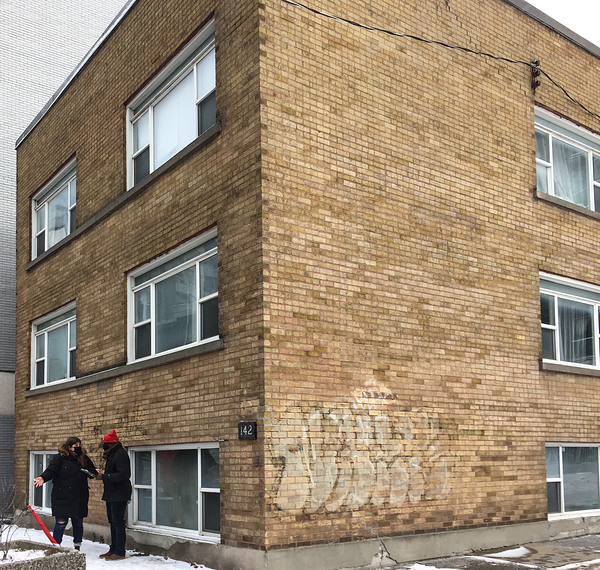
Alayne McGregor/The BUZZ
Tamir Virani
There is a dire need for action at all levels of government to address the affordable housing crisis in Ottawa. Whether this involves curbing the loss of affordable housing, creating more affordable housing, or preserving the quality of existing affordable housing, systemic and policy changes are urgently needed to protect our most vulnerable.
As an example, there’s a large federal office building right next to my apartment in the heart of Centretown. It has been vacant and lifeless for about five years. Even before the pandemic ushered in a new world of remote work, this 15-storey building was uninhabited. Every time I stare at the empty floors, which remain lighted at night, I can’t help but think of how many homeless, or marginalized, low-income families could inhabit this space.
“It’s frustrating to see all these empty office towers downtown and then see people outside in the cold,” I told a friend a few weeks ago during dinner. “Why don’t they convert these into sustainable housing or at least do something with these spaces?”
My friend responded, “Maybe because they think it’s a money-losing venture. The return is to society and not an organization.”
While it was a particularly disheartening and gloomy response, I knew he was right. It’s no secret that homelessness is on the rise, particularly in urban cores like Centretown. Homeless, youth at risk, refugees and those vulnerably housed have all faced challenges that have been compounded since COVID-19. At the Centretown Community Health Centre (CCHC), approximately eight percent of clients fall into these categories. The number of people from these groups accessing CCHC services has increased by over 85 percent in the past two years. This spike in clients accessing outreach services serves as a clear indication that lack of sustainable and affordable housing is only getting worse.
Stopping renovictions
You may have heard the term Renoviction or Demoviction before but you may not be fully aware of how this has slowly and insidiously fueled the housing crisis in Ottawa. Renovictions, which take place when tenants must move out of a residence to accommodate changes or renovations to a space, allow landlords to raise rent beyond the limit set by the province (1.2 percent in 2022). While this extra rent increase may seem marginal to some, it leaves low-income tenants and families out on the streets when they can no longer afford rent increases.
City Councillors Catherine McKenney and Jeff Leiper have already spoken out against this, urging the city to create policies to mitigate the displacement of tenants. But nothing has come to fruition yet. The CCHC is calling for municipal policies that will strengthen tenant protections against renovictions, ensuring that displaced tenants are re-housed at the same rate of rent and are fully aware of their legal rights to compensation. We already know this works: in New Westminster, BC, a similar bylaw was introduced which cut down renovictions from 333 to zero once it was introduced in 2019.
Creating more units
Just before the pandemic, Ottawa was the first city in Canada to officially declare a housing crisis in 2020. Current waitlists for affordable housing in Ottawa sit in the thousands and that number is steadily rising. Pair this with bone-chilling temperatures during unforgiving Ottawa winters and you can see how the term “crisis” is far from an embellishment.
Part of the CCHC’s calls to action include asking for a municipal budget increase to house 1,000 households each year and committing 30 percent as part of a “For Indigenous, By Indigenous Housing Strategy.” This increase alone would double the city’s current commitment to house 500 households through rent subsidies and the creation of non-profit units. In theory, this could slash homelessness and the social housing registry waitlist in half by 2030.
Preserving quality
In 2019, Toronto revised its Housing Charter and the city manager was directed by City Council to establish the role of a housing commissioner. The commissioner would be mandated to ensure that the city was taking concrete action to combat systemic housing discrimination and hurdles in the housing system.
Without an actual authority to enforce accountability, any city commitments to housing protection are moot. An official and independent Ottawa housing commissioner would be able to identify and dismantle violations of the right to housing, provide City Council with recommendations to address the ongoing housing crisis, and monitor progress in meeting milestones and targets in city plans to combat housing inequities.
As a resident of Centretown, I love the area that I’m privileged to live in. There is a sense of community, closeness and culture. But, as great as Centretown is, it is in no way immune to the major inequities and discrimination that often run rampant in urban centres. Newcomers, low-income families, homeless, youth at risk and other marginalized groups need help.
There is a role for both the private and public sectors. There must be pressure, accountability and onus put on those in roles of responsibility to address these issues. As my friend pointed out in our conversation, the return to society is more than enough reason to act.
This is the second article in a series about issues to consider leading up to the Ontario election on June 2, and the city election on October 24.
